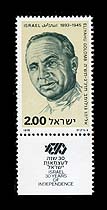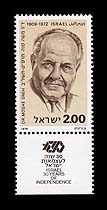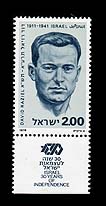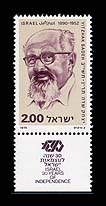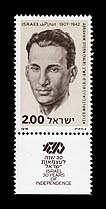|
Eliyahu Golomb
Eliyahu Golomb was born in 1893 in Volkovyak in Russia and came to Eretz Israel at the age of 16. He completed his studies at the Herzlia Gymnasium where he was a member of the first graduating class and found time to organize the first group of students to prepare themselves for a pioneering life. Following his graduation he left for Degania but upon his father's death had to return to Jaffa to manage the family flour-mill.
During the First World War he was ordered to operate the mill on the Sabbath for the Turkish army and when he 'refused, was publicly whipped by order of the Governor of Jaffa. His hatred of Turkish rule led him to oppose those members of the Yishuv who encouraged Jews to volunteer for the Turkish army. In 1917 he headed the volunteers for the Jewish Legion and successfully opposed the plans of the British commander to send the volunteers to fight outside the country. After the "Ha-Shomer" organization was disbanded, Golomb was one of the initiators and moulders of the Hagana as the supreme defence body of the Yishuv. He was also an outstanding workers' leader and one of the founders of the "Ahdut Ha-Avoda" party.
During the period 1922-24 he was engaged in purchasing arms in Vienna, Berlin and Paris and on his return became the chief figure in the Hagana and was, in fact, its commander although he had neither title nor rank. His authority was personal. moral and political.
His home on Rothschild Boulevard. Tel Aviv (which today houses the Hagana Museum) served as the committee room for those concerned with the security of the Yishuv and it was from there that most of the major decisions of the time originated - the decision not to undertake reprisals at the time of the "disturbances"; the setting-up of "Tower and Stockade" settlements; the formation of the Field Force and the Palmab; the despatch of parachutists to occupied Europe. With the death of Eliyahu Golomb on the 30th lyar 5708 (1945), the Jewish labour movement lost one of its outstanding figures and the Jewish people one of its leaders most concerned with ensuring the security of the Zionist enterprise.
David Raziel
David Raziel, or "Aluf (Brigadier) Ben-Anat" as he was known in the underground, the commander of the Irgun Zevai Leumi, was born in 1911 in Jerusalem. He studied both in yeshiva and at the Hebrew University. He was a member of Betar and a fervent believer in Jewish nationalism and while yet a youth. learned the use of weapons.
In 1937 he and his friends decided to abandon the policy of self-restraint practised against the Arab terrorists and following successful raids on terrorist groups at the time of the "disturbances". he was chosen to head the Irgun and it was he who transformed it into a military fighting force. He was hunted by the British and in 1939 travelled to Poland to recruit tens of thousands of Betar and Irgun members to join the fight for
Jewish national independence, war caught and arrested by the British. When the Second World War broke out, he was released and ordered his forces to declare a truce and help the British in their struggle against the Nazis. He set a personal example by leading a dangerous commando espionage mission to Iraq (which was then collaborating with the Germans) for British Military Intelligence. He hoped to take advantage of this opportunity to capture the Mufti Haj Amin El Husseini who had taken refuge in Iraq.
Raziel was killed in a German air-raid in Iraq and was buried at Habbaniya. In 1955 he was reinterred in Cyprus and in 1961 his remains were brought to Israel for burial in the military cemetery on Mt. Herzl in Jerusalem. David Raziel created a Jewish fighting force, prepared it for battle and died in the fight against the Nazis. He will always be honoured as one of the Jewish people's bravest fighters, as one who laid the foundations of our national defence and as an outstanding example of the Jewish officer whose battle-cry is "Follow mel"
Yizhak Sadeh
Yizhak Sadeh was born in Lublin, Poland in 1890 where he received a traditional education. During the First World War he served as a sergeant-major in the Czarist Army and was awarded the St. George Cross. In 1917 he joined the Red Army where he commanded a company. With the end of the fighting in Russia he went to study philosophy and philology and took up wrestling and weight-lifting. When in 1920. the news of his friend Joseph Trumpeldor's death at Tel Hal reached him, he decided to emigrate to Eretz Israel and left the Crimea with the first - He-Halutz" group and volunteered for the Hagana.
He was one of the founder-members of the "Joseph Trumpeldor Labour Batallion" and the "HaPoel" Sports. Organization. He received a four-month prison sentence from the British Mandatory Government for protecting a Jew from the hands of Arab policemen in Jerusalem.
Following the outbreak of the 1936 disturbances he was given the command of a mobile Hagana unit in Jerusalem which carried out raids on terrorist bases. He then joined Kibbutz Yagur and set-up the Special Field Squads which he himself commanded.
In 1939 he commanded the Task Forces, the special Hagana units, in opposing the White Paper. He was one of the founders of the Palmach in 1941 and was its first Commanding Officer until 1945.
In 1946 he was given command of the Hagana's "Armoured Force" and directed the battle of Mishmar Ha-Emeq against Kawukji. As commander of the 8th Brigade, Zahal's first armoured force, he was responsible for the successful "Operation Jebusite" in the Jerusalem area, was promoted to Aluf (Brigadier). captured Lod airport. "Fortress Yoav" and was in charge of "Operation Horeb".
At the end of the War of Independence he retired from Zahal and devoted himself to writing. He was also one of Mapam's representatives on the Tel Aviv Municipality. He died in 1952. As an outstanding military commander and an educationalist par excellence, the "Old Man" was at one and the same time a Zionist and social visionary and the formulator of Zahal's military doctrine both in the matter of its daring offensive tactics and its belief in the "purity of arms".
Dr. Moshe Sneh
Dr. Moshe Sneh, (Kleinbaum) born in 1909 in the Polish village of Radzyn. was an active Zionist and public figure from his youth. He studied medicine at Warsaw University where he headed the Zionist student group. When his teacher and mentor Yizhak Grunbaum emigrated to Israel in the early thirties, Sneh was chosen to be chairman of the Central Committee of the Polish Zionist Organization at the early age of 24. It was then that he revealed his talents as one of the outstanding Polish-Jewish orators and publicists.
At the outbreak of the Second World War he was called-up as an officer in the Polish army. In March 1940 he arrived in Eretz Israel and shortly afterwards was chosen to be a member of the Hagana general staff. In 1941 he was appointed its commander-in-chief and served in that capacity for six years. From 1943 to 1948 he was a member of the Vaad Ha-Leumi. In August 1945 he was appointed to the Jewish Agency Executive and from October of that year headed the Jewish resistance body formed from the three underground movements. On the infamous "Black Sabbath" of June 1946 his name was at the head of the British "wanted" list but he got away secretly to Paris where he headed the European Political Department of the Jewish Agency and was in charge of "illegal" immigration (Allys "Bet"). In December 1947 Moshe Sneb resigned from the Jewish Agency because of political and ideological differences of opinion. In January 1948 he took part in the founding conference of the Mapam party. From 1955 he was head of the Maki (Communist) faction p the Knesset and editor of "Kol Ha-Am". Throughout the communist jeriod of his life he remained a steadfast Zionist and continued to preach on the natural connection between the people of Israel and their homeland. While struggling to bring about Israel-Arab understanding and peace, he was outspoken in his fierce opposition to extremist Arab nationalism.
He was admired and accepted by all circles of Israel life and was considered to be one of the country's most brilliant parliamentarians and public figures - a personality who knew the secret of how to combine a concern for society and the working man with a fierce love for Israel.
Avraham Stern
Avraham Stern, or "Yair" as he was known in the underground, was born in Suwalki, Poland. He came to Eretz Israel in 1925, studied social science in Jerusalem and excelled in classics. He then went to Italy for further studies and in 1929 took part in the defence of Jerusalem. In spite of his theoretical and poetical inclinations, the ivory tower was not for him and in 1933 he decided to give up his studies and devote himself heart and soul to the Jewish people's struggle for independence in its own homeland. He joined Jabotinaky's "National Defence" movement and when it split he helped found the Irgun Zevai Leumi. He was the initiator of the first underground radio station and collaborated with David Raziel in writing a manual on the use of the revolver.
Prior to the Second World War he was active in recruiting volunteer fighters and immigrants from the ranks of Polish Jewry. When the War finally broke out, he chose to continue the struggle against British rule and when his policy was not adopted, he founded the "Lohame Herut Yisrael" - "Lehi" (known to the British as the "Stern Gang") which, under his leadership, continued the uncompromising fight against the foreign power in defiance of the policy of the majority of the Yishuv which was to call a truce until the real enemy -the Nazis - were defeated.
On the 12th of February 1942 Yair's hiding-place in Tel Aviv was discovered by the British police and he was arrested, bound and murdered. But his death did not mean the end of the struggle of Lehi - on the contrary, the battle continued to rage ever more fiercely until the State was established.
Avraham Stern was one of the most romantic figures in the history of the Zionist struggle. He was at one and the same time a gentle and sensitive intellectual and a fearless patriot who, in his refusal to compromise with foreign rule provided an outstanding example of single-mindedness and supreme personal sacrifice.

